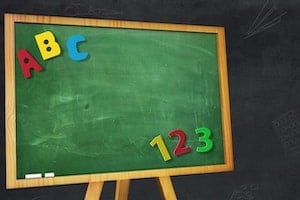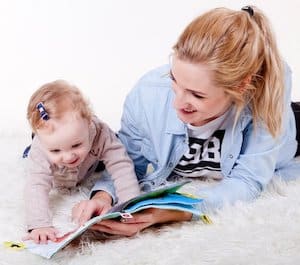As a new parent in today’s fast-paced world of designer baby clothes, au pairs, private schools and tutors, you’re probably worried that your newborn child won’t be able to start pre-school because they don’t know calculus. Don’t worry, calculus isn’t a prerequisite for pre-school; kindergarten maybe. Just kidding. Learn your ABC’s and count 123, now that’s a different story.
Given the recent college admission scandals, it does seem that competitive these days. If your child isn’t a genius when they start school, they’re doomed. Thankfully that’s not the case. You need not worry. As long as our child knows their letters and numbers, and how to ask to go to the bathroom, they’ll be miles ahead of most of their newfound classmates when they start school.
Academic Challenge Number One
Learning the alphabet is usually the first major academic challenge your child will face in life. Well that is, right after they complete the first word “Mom” or “Dad” competition. You can’t fool me. I know all you new parents always compete for the coveted first-word proclamation.

Anyway, learning the alphabet is a must. After all our advances in technology 14 percent of the United States adult population, 32 million people, still cannot read. Less than half of the adult American population reads literature anymore. And NO…your Facebook feed and other social apps are not considered literature.
Children just don’t wake up one day and magically know their alphabet. Like all things in life, they have to learn it. Like most learning, a child begins to learn their ABC’s at home with their parents. Unfortunately, too many children today don’t have two parents at home. Plenty don’t even have one, or parents that take an interest in their development.
Parents who take an active role in reading to their children are the key to this first academic challenge of their child’s life. Children whose parents regularly read to them have an understanding of letters and numbers by the age 3. And those children who know their ABCs before starting school are on average about one year ahead of peers who don’t know the alphabet before entering school. These are benefits that children, who complete academic challenge number one early in life, take with them into adulthood.
Benefits Gained When You Learn Your ABC’s Early

Children who learn their ABC’s early in life usually develop a more thorough vocabulary, as well as begin to read earlier. Often when these children start school their teachers will provide a little extra-personalized attention to them, furthering the development of their language and reading skills. Side note: sometimes kids who are “too advanced” when they start school are labeled as troublemakers. This is usually because they are “bored” with activities that are already below their learning level. If your child falls into this category, make sure you work with their teacher and school to ensure they are in the proper grade for their level of understanding.
Another benefit of learning one’s ABC’s early in life is that it usually helps a child develop stronger emotional and social skills. Being taken out of their home setting for the first time for an entire day can be an emotional strain on some children. Add to that the struggle of dealing with tasks that their classmates may have already mastered, just adds to their levels of stress. Self-confidence is a huge motivator and those students, who don’t have to struggle with their early learning lessons like their ABCs and numbers, will be much happier and more productive.
Learn Your ABC’s And Count 123
Yes, it would be great if your children just woke one day and were little geniuses. But don’t hold your breath waiting for that day to come. Instead, take a proactive approach earlier in your child’s life and help them get started on the right foot, one that will not only help them in school but also throughout life as well.

Start reading to them day one! Well maybe not day one, since you’ll probably be exhausted from the thrills of child labor and need some sleep yourself. Just don’t put it off until they are filling out their college applications.
Simple picture books with pretty pictures are a great way to start. Young children are very visual learns and learn by seeing and touching. Besides, we all know they won’t understand most of the stuff you’re saying anyway. Familiarity and repetition are the processes that you’re striving for at this point in their developmental stage. The sooner reading becomes a daily task for them the less likely they will see it as a “must-do” task and think of it as a “fun do” activity.
Reading Benefits Everyone
As you read, begin to point out letters and words. Especially those common words that your child will need to know most in their early years. And make a BIG deal about it when pronouncing those letters and words too! Don’t just say a, b, c, mom, dad. Put some real effort into it like: AAAAA, BBBBB, CCCCC, MOOOOOM, DAAAAD! BATHROOM NOW!!! The sooner they know that last one, the easier life is for everyone. And don’t worry, nobody will be around watching you make a fool of yourself ;o)
Once your child can sit-up on their own and no longer tries to eat everything they get their little hands-on, think about getting those magnetic alphabet letters that we all played with on the refrigerator growing up. Although you will find letters all over the kitchen floor and in the dog’s bowl, those little pieces of plastic can be a major building block in your child’s ability to learn. My friend Christine once told me, “that’s how I learned my ABC’s and to count 123.”
In addition to those magnetic alphabet letters, letter and number flashcards are another great way to help your child. You can create all kinds of games to keep children interested while helping them learn their ABC’s and count 123.
Life’s Journey
Parents that help their children accomplish this first major academic challenge of their life’s journey are doing more for their children than they realize. There is no single activity that is responsible for the decline of reading. Yet reading has taken a backseat to electronic media. The cumulative presence and availability of these alternatives have increasingly drawn Americans away from reading. – NEA, “Reading at Risk: A Survey of Literary Reading in America,” June 2004.
The decline in reading is a stark reality. What better way is there to help your little ones get started on their first academic challenge? Help them become an ABC and 123 counting wiz by picking up a copy of Alphabet Stuff With Nuff today. Read along with your child and discover how not a day goes by where I’m not thinking of all types of crazy animals and counting the hidden things I see…A, B, C, D, E, F, G all the way to X, Y, Z and don’t forget to count…1, 2, 3 along the way.
